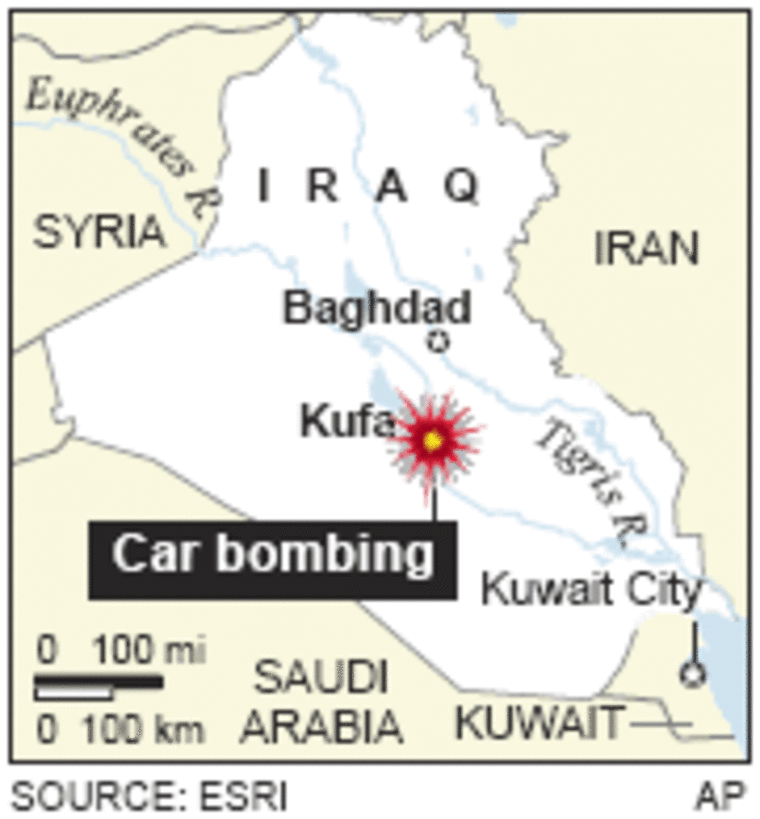A car bomb tore through a busy market in the Shiite holy city of Kufa on Tuesday, killing at least 16 people and wounding 70 in an attack sure to further enflame tensions between Iraq’s Sunni and Shiite populations.
The bombing came a day after Iraq’s Sunni vice president threatened to leave the Shiite-dominated government unless key unspecified amendments to the constitution were made by May 15.
The blast at Kufa struck about 10 a.m. in an area that also included a school and the mayor’s office. The 16 killed included women and children, said Salim Naima, spokesman of the Najaf health department.
“It was a huge explosion, its force threw me a few meters away from my wife,” said Hussein Abid Matrod, a 38-year old taxi driver who was shopping with his wife and suffered shrapnel wounds to his back and legs. “I saw many people on the ground as smoke mixed with dust, and the smell of the gunpowder was everywhere.”
Panicked people ran through the corridors searching for their relatives at al-Furat al-Awsat hospital in nearby Najaf. Women in black abayas, traditional Islamic cloaks, pounded their chests and faces in grief.
“We are poor people looking for anything to secure our livelihood and we have nothing to do with politics. Why do they do this to us?” asked Firas Abdul-Karim, a 23-year-old day laborer who was wounded in the blast.
The revered Kufa mosque was about 400 yards from the blast. Millions of Shiite Muslim pilgrims visit the shrines at Kufa and its sister holy city of Najaf, home to top Shiite cleric Grand Ayatollah Ali al-Sistani as well as radical anti-U.S. Shiite cleric Muqtada al-Sadr.
Baghdad crackdown blamed for unrest in south
The predominantly Shiite southern areas have seen a spike in violence and unrest, blamed in part on militants who have fled a security crackdown in Baghdad.
On April 28, a suicide car bomber killed 68 people in a crowded commercial area near two of Iraq’s most sacred Shiite shrines in Karbala, 45 miles northwest of Kufa. That attack came two weeks after a car bombing killed 47 people killed and wounded 224 wounded in the same area.
Hillah, about 60 miles south of Baghdad, also has been hit by some of the deadliest bombings this year, including a double suicide attack that killed 120 Shiite pilgrims and another one that killed 73 people in a market. Kufa itself was struck by a Dec. 30 at the fish market that killed 31 people.
Also Tuesday, a roadside bomb went off next to a passing mini bus in the Shiite area of Zafaraniyah on the southeastern outskirts of Bagdad, killing three passengers and injuring five others, police said.

At least 68 people were killed or found dead nationwide on Monday, police said, including the bullet-riddled bodies of 30 men found in Baghdad — the apparent victims of sectarian death squads.
All but two were found in west Baghdad, including 17 in the Amil neighborhood where Sunni politicians have complained of renewed attacks by Shiite militiamen, said a police official who spoke on condition of anonymity because he was not supposed to release those details.
A suicide bomber struck a market on the outskirts of the city of Ramadi, west of Baghdad, Monday afternoon, killing eight people, said police Col. Tariq Youssef. About 15 minutes later, a second car bomb struck a nearby checkpoint, killing five people, including two policemen, Youssef said.
The attacks occurred in areas controlled by the Anbar Salvation Council, an alliance of Sunni tribes formed last year to drive al-Qaida from the area. Council officials blamed the attacks on al-Qaida.
“They committed this crime because we have identified their hideouts and we are chasing them,” said Sheik Jabbar Naif al-Dulaimi.
Al-Qaida issues a warning
In a Web statement Monday, an al-Qaida front organization, the Islamic State of Iraq, warned Sunnis against joining the government security forces — a move supported by the Salvation Council.
“We tell every father, mother, wife or brother who does not want to lose a relative to advise them not to approach the apostates and we swear to God that we will use every possible means to strike at the infidels and the renegades,” the group said.
The Islamic State also claimed responsibility for attacks that killed 34 people over the weekend.
Also Monday, the military announced a U.S. soldier was killed by small-arms fire in western Baghdad the day before, bringing to nine the number of American personnel slain Sunday.
The security situation in the capital figured high in talks between Prime Minister Nouri al-Maliki and President Bush, who spoke Monday in a video conference.
Al-Maliki told Bush of the need to maintain cooperation between U.S. and Iraqi forces as they continue their campaign to end the chaos and violence in Baghdad, the prime minister’s office said in a statement.
White House spokesman Tony Snow said Bush and al-Maliki spoke about the Iraqi leader’s push for political reconciliation, which is considered vital to bring stability.